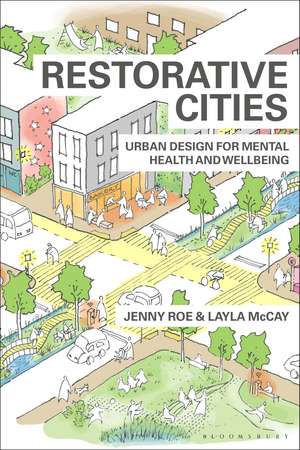Restorative Cities: urban design for mental health and wellbeing
Autor Jenny Roe, Layla McCayen Limba Engleză Paperback – 11 aug 2021
| Toate formatele și edițiile | Preț | Express |
|---|---|---|
| Paperback (1) | 183.54 lei 3-5 săpt. | +38.37 lei 4-10 zile |
| Bloomsbury Publishing – 11 aug 2021 | 183.54 lei 3-5 săpt. | +38.37 lei 4-10 zile |
| Hardback (1) | 514.43 lei 3-5 săpt. | +114.27 lei 4-10 zile |
| Bloomsbury Publishing – 11 aug 2021 | 514.43 lei 3-5 săpt. | +114.27 lei 4-10 zile |
Preț: 183.54 lei
Preț vechi: 195.99 lei
-6% Nou
Puncte Express: 275
Preț estimativ în valută:
35.12€ • 36.76$ • 29.23£
35.12€ • 36.76$ • 29.23£
Carte disponibilă
Livrare economică 10-24 martie
Livrare express 21-27 februarie pentru 48.36 lei
Preluare comenzi: 021 569.72.76
Specificații
ISBN-13: 9781350112889
ISBN-10: 1350112887
Pagini: 272
Ilustrații: 62 colour illus
Dimensiuni: 156 x 234 x 19 mm
Greutate: 0.59 kg
Editura: Bloomsbury Publishing
Colecția Bloomsbury Visual Arts
Locul publicării:London, United Kingdom
ISBN-10: 1350112887
Pagini: 272
Ilustrații: 62 colour illus
Dimensiuni: 156 x 234 x 19 mm
Greutate: 0.59 kg
Editura: Bloomsbury Publishing
Colecția Bloomsbury Visual Arts
Locul publicării:London, United Kingdom
Caracteristici
Each chapter presents, first, the theoretical framework that underpins a particular theme - green spaces; urban water settings; city smells, tastes and sounds; neighbourbood relations; physical health and exercise; play; inclusivity - followed by the empirical evidence that supports a relationship between that theme and mental health outcomes, and then offers broad-brush design guidelines at both a community level and a larger-scale city level
Notă biografică
Jenny Roe is Mary Irene DeShong Professor of Design & Health and Director of the Center for Design & Health in the School of Architecture, University of Virginia. An environmental psychologist and former head of Landscape Architecture for an international architectural practice, she has written extensively on restorative environments including for the World Health Organization and The Lancet.Layla McCay is Director of the Centre for Urban Design and Mental Health, London. A psychiatrist and public health specialist, she is co-editor of Urban Mental Health and managing editor of the Journal of Urban Design and Mental Health; she features regularly in a wide range of print and broadcast media, from The Financial Times to BBC Question Time.
Cuprins
List of IllustrationsPreface Acknowledgements1. Introduction to Restorative Urbanism2. The Green City3. The Blue City4. The Sensory City5. The Neighbourly City6. The Active City7. The Playable City8. The Inclusive City9. The Restorative CityReferencesIndex
Recenzii
[A]n inspiring, educational, and succinct tour of the intersection of applied psychology, urban planning and design, and public health ... Restorative Cities: Urban Design for Mental Health and Wellbeing is both prudent and empowering ... Readers of the book are left with what feels like an accessible and modern handbook about how to envision and create humane urban settings that tend to the many psychosocial factors that matter now - and will for generations to come.
A welcome, timely and important addition to the existing healthy urban planning literature ... Restorative Cities provides the evidence, the inspiration and a call to action. Now we have to act.
More than ever, we need the places where we live, work and play to support our mental health. For those creating the built environment, Restorative Cities offers deep health expertise translated into the practical strategies that respond to today's demand for cities that prioritise their residents' health.
Post-Covid 19, cities must be equitable and sustainable, and people should live more healthily and happily. Restorative Cities shows how we can do this, by focussing urbanism on mental health and wellbeing.
Timely ... A useful contribution to the interdisciplinary nature of urban design.
A welcome, timely and important addition to the existing healthy urban planning literature ... Restorative Cities provides the evidence, the inspiration and a call to action. Now we have to act.
More than ever, we need the places where we live, work and play to support our mental health. For those creating the built environment, Restorative Cities offers deep health expertise translated into the practical strategies that respond to today's demand for cities that prioritise their residents' health.
Post-Covid 19, cities must be equitable and sustainable, and people should live more healthily and happily. Restorative Cities shows how we can do this, by focussing urbanism on mental health and wellbeing.
Timely ... A useful contribution to the interdisciplinary nature of urban design.
